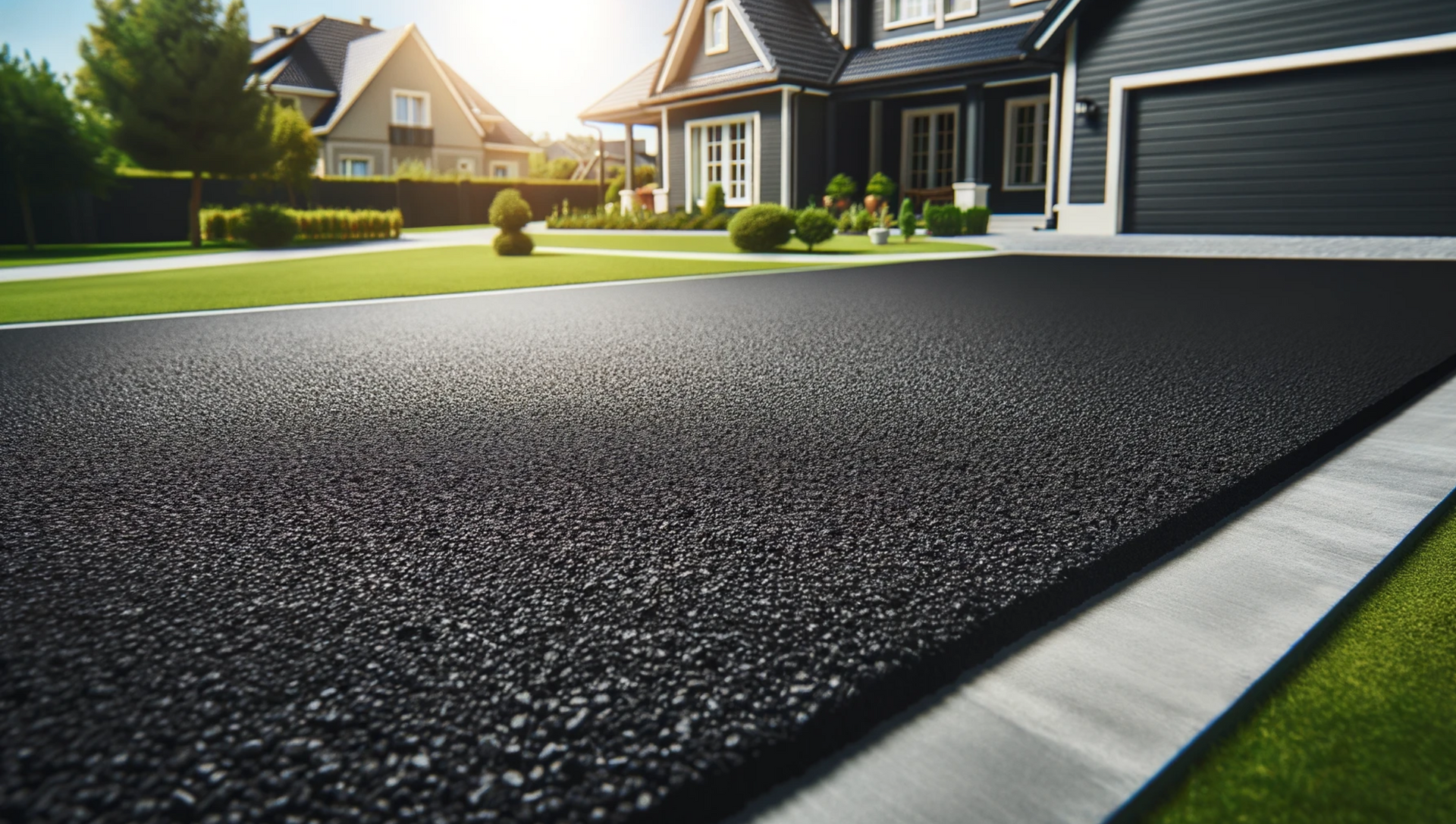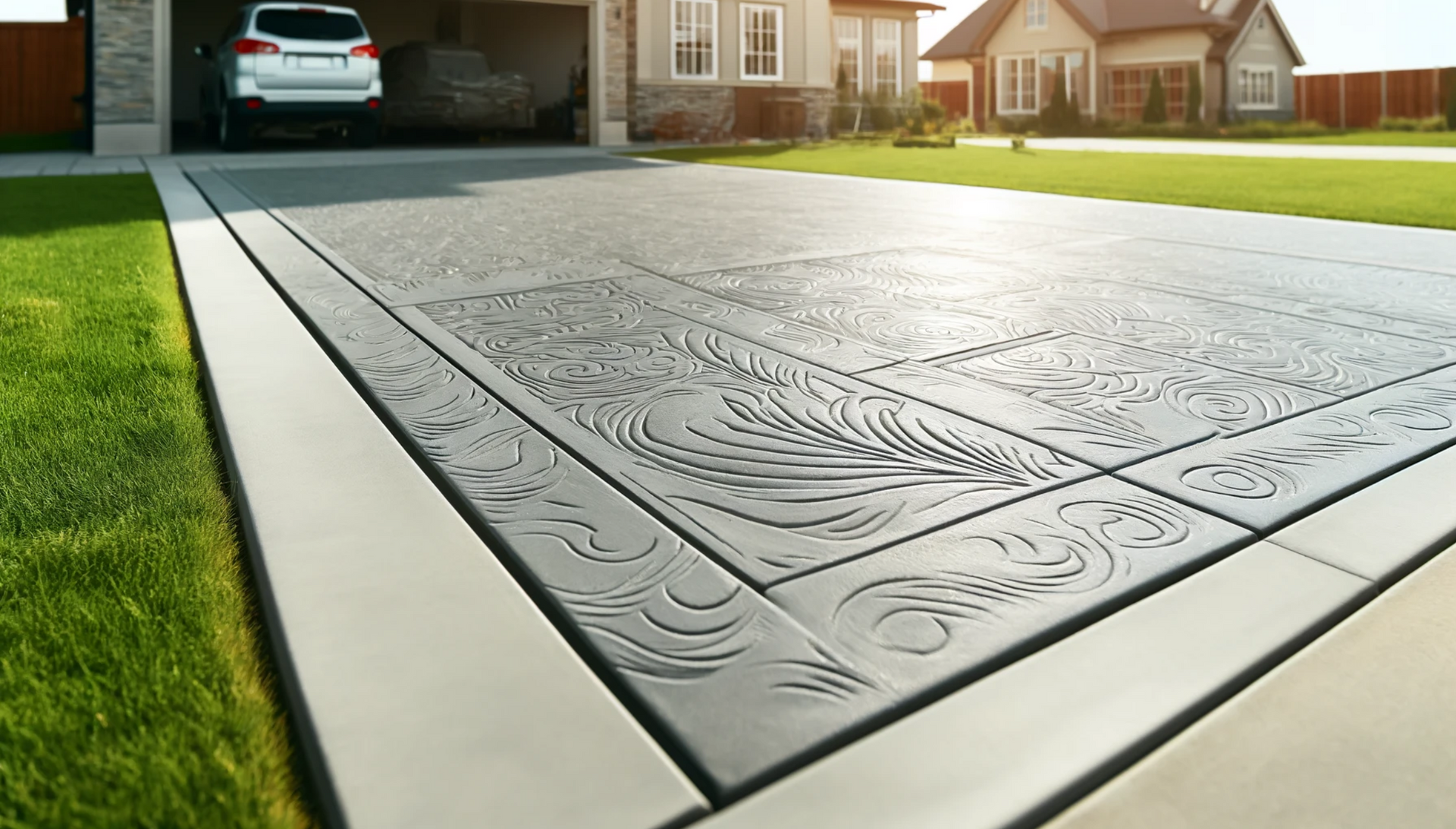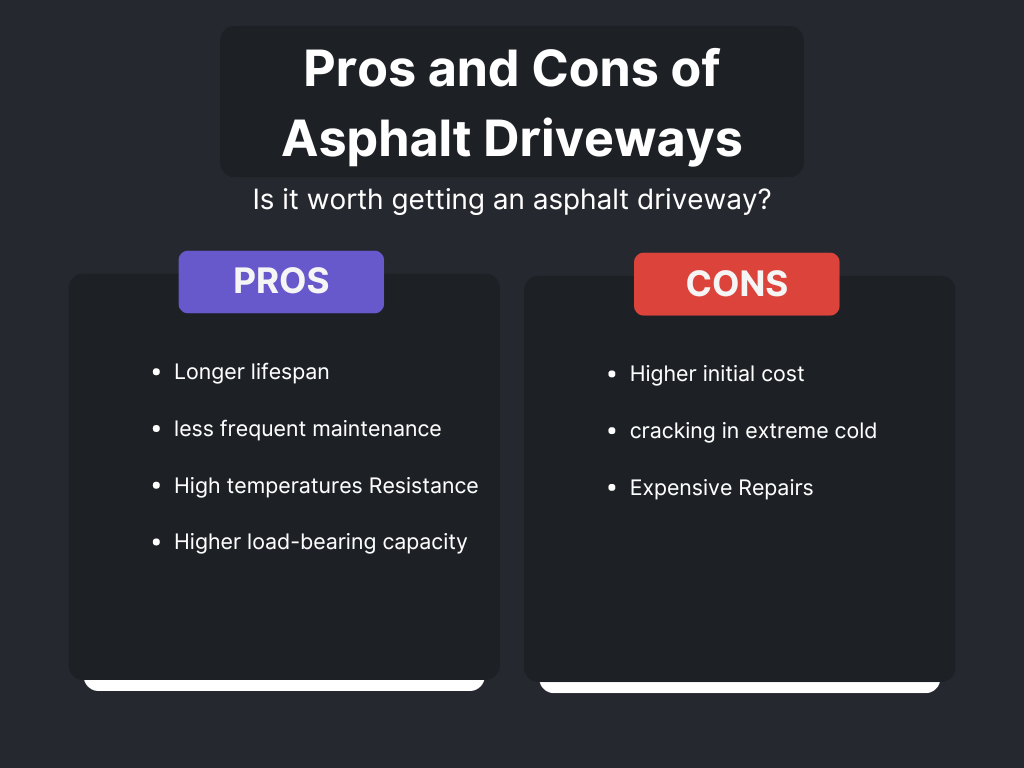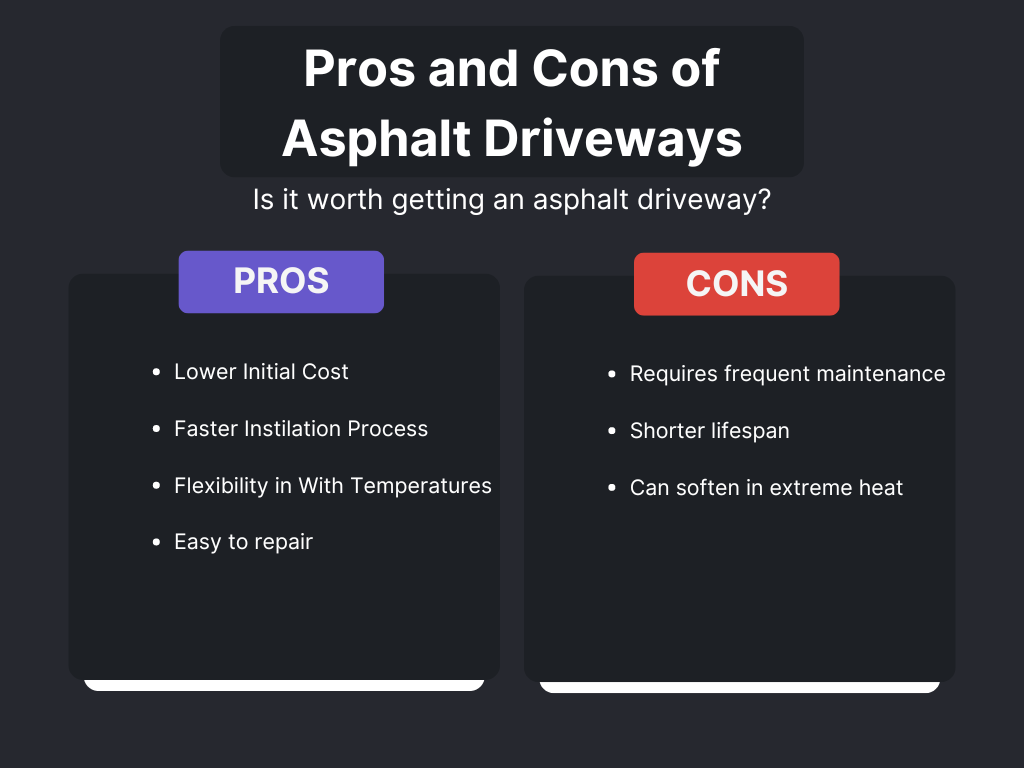Comparing Asphalt and Concrete Driveways: A Comprehensive Guide to Making the Right Choice
Asphalt Driveways
- Cost-effective: $2 to $5 per square foot
- Flexible and less prone to cracking in cold weather
- Requires regular maintenance, including seal coating every 3-5 years
- Lifespan: 15-20 years with proper care
- Environmental impact: Highly recyclable but involves petroleum
Concrete Driveways
- Durable and long-lasting: $4 to $10 per square foot
- Wide variety of decorative options
- Low maintenance with occasional sealing
- Lifespan: 30-40 years with proper care
- Environmental impact: Long lifespan but cement production is energy-intensive
Choosing the right material for your driveway is crucial for both the aesthetics and functionality of your home. Asphalt and concrete are two of the most popular choices, each offering distinct advantages and drawbacks. This comprehensive guide will help you make an informed decision by comparing these materials across various aspects such as cost, durability, maintenance, and environmental impact.
Material Overview
Asphalt Driveways
Asphalt, also known as bitumen, is a sticky, black, and highly viscous liquid or semi-solid form of petroleum. It is commonly used for roads, driveways, and parking lots. In terms of durability, asphalt driveways typically last 15-20 years with proper maintenance. They are flexible, which makes them less prone to cracking in cold weather. Asphalt provides a smooth, sleek, and dark appearance. It can look appealing when newly installed but may require regular seal coating to maintain its appearance. It is generally more cost-effective than concrete, with prices ranging from $2 to $5 per square foot.

Concrete Driveways
Concrete is a composite material composed of fine and coarse aggregate bonded together with a fluid cement that hardens over time. It is widely used for driveways, sidewalks, and buildings. Concrete driveways can last anywhere from 30-40 years with proper care. They are highly durable but can crack in extremely cold conditions if not properly installed and maintained. They also offer a wide range of finishes, from plain and smooth to decorative textures and colors. It can be stamped or stained to mimic the look of stone, brick, or tile. Generally the price is higher compared to asphalt, with prices ranging from $4 to $10 per square foot.

Pros and Cons of Asphalt Driveways
Pros
Asphalt driveways offer several advantages, starting with their cost-effectiveness. They have a lower initial cost compared to other materials, making them an attractive option for many homeowners. Additionally, the installation process is quicker, allowing you to use your driveway sooner. Asphalt is also known for its flexibility in extreme temperatures, which helps reduce the likelihood of cracking. Moreover, repairs are relatively simple and can be completed quickly, ensuring your driveway remains in good condition.
Cons
However, there are some drawbacks to consider. Asphalt driveways require regular maintenance, such as seal coating every 3-5 years, to prolong their lifespan. Speaking of lifespan, asphalt typically does not last as long as concrete. Another concern is heat sensitivity; in extreme heat, asphalt can soften, leading to potential damage. Despite these cons, many find the benefits of asphalt driveways outweigh the downsides, particularly for their affordability and ease of repair.
Pros and Cons of Concrete Driveways
Pros
Concrete driveways come with several notable advantages. One of the most significant benefits is their longer lifespan, requiring less frequent maintenance compared to other materials. They also offer a wide variety of decorative options, allowing homeowners to customize the look of their driveway to complement their home’s aesthetic. Concrete performs better in high temperatures, maintaining its integrity without softening. Additionally, it boasts a higher load-bearing capacity, making it ideal for supporting heavy vehicles.
Cons
However, there are a few downsides to consider. Concrete driveways have a higher initial cost, which can be a deterrent for some homeowners. They are also susceptible to cracking in extreme cold if not properly maintained, which can lead to more significant issues over time. Furthermore, repairing cracks in concrete can be more difficult and expensive compared to other materials. Despite these cons, the durability and aesthetic versatility of concrete driveways make them a popular choice for many.

Installation Process of Asphalt Driveways
Steps
- Excavation and grading of the site.
- Installation of a gravel base.
- Compaction of the gravel base.
- Application of the asphalt layer.
- Compaction of the asphalt layer.
- Cooling and hardening process.
This process typically takes 1-2 days to complete
Installation Process of Concrete Driveways
Steps
- Excavation and grading of the site.
- Installation of wooden forms to outline the driveway.
- Placement of a gravel base.
- Installation of rebar or wire mesh for reinforcement.
- Pouring and spreading the concrete.
- Smoothing and finishing the concrete surface.
- Curing process, which can take up to 7 days.
Installing the concrete driveway will typically take 3-7 days, including curing time
Maintenance and Longevity of Asphalt
To ensure your asphalt driveway remains in optimal condition, it's important to follow a few key maintenance tips. Firstly, applying a seal coat every 3-5 years helps protect the surface from weather and wear, maintaining its durability and appearance. Promptly filling any cracks and potholes is crucial to prevent further damage and avoid more costly repairs in the future. Regular cleaning is also essential; removing debris and preventing staining not only keeps the driveway looking good but also extends its lifespan. With proper maintenance, an asphalt driveway can last between 15-20 years, providing a functionality for years to come.
Maintenance and Longevity of Concrete
To keep your concrete driveway in top condition, it's important to adhere to some essential maintenance practices. Applying a sealer every few years helps protect the surface from stains and weather, ensuring it remains in good shape. Regular cleaning is necessary to prevent the buildup of dirt and grime, which can affect both appearance and durability. Additionally, repairing cracks and chips promptly is crucial to maintaining the structural integrity of the driveway. With proper maintenance, a concrete driveway can last between 30-40 years, offering a long-lasting and reliable surface for your home.
Environmental Impact
Asphalt Benefits
- High Recyclability: Asphalt is 100% recyclable, making it one of the most recycled materials in the construction industry.
- Use of Recycled Materials: It can be produced using recycled materials, which reduces the need for new raw resources and minimizes waste.
- Pervious Asphalt Options: There are environmentally friendly options like porous asphalt, which allows water to pass through, reducing runoff and promoting groundwater recharge.
Drawbacks
- Petroleum-Based Production: The production of asphalt involves petroleum, which has significant environmental impacts due to extraction and processing.
- VOC Emissions: Installation off-gasses volatile organic compounds (VOCs), contributing to air pollution and potential health risks.
- Urban Heat Island Effect: Asphalt absorbs more heat, contributing to higher temperatures in urban areas.
Concrete Benefits
- Extended Longevity: The long lifespan of concrete reduces the need for frequent replacements, thereby lowering the overall environmental footprint.
- Incorporation of Recycled Materials: Concrete can be made with recycled materials and industrial byproducts, which helps reduce the demand for new raw materials and minimizes waste.
- Reflectivity: Concrete reflects more sunlight, which can help reduce the heat island effect in urban areas.
Drawbacks
- High Energy Consumption: The production of cement, a critical component of concrete, is energy-intensive and generates significant CO2 emissions.
- Runoff Concerns: If not properly managed, concrete surfaces can lead to runoff issues, affecting local water quality and drainage systems.
At
Hamilton Concrete Works, we are committed to helping you make an informed decision that fits your needs, budget, and style. Contact us today for a
free consultation and estimate. Visit or call us at
929-388-6490 to start transforming your driveway.
What are the cost factors for concrete driveways?
Costs can vary based on the size of the driveway, local material and labor costs, and any decorative features. Typically, the cost ranges from $4 to $10 per square foot.
Can asphalt driveways be installed in cold climates?
Yes, asphalt driveways can be installed in cold climates. Their flexibility helps them adapt to temperature fluctuations, reducing the risk of cracking. However, it is essential to use the right mix and thickness to withstand freeze-thaw cycles, and proper maintenance is necessary to ensure longevity.
What are the cost factors for asphalt driveways?
Costs can vary based on the size of the driveway, local material and labor costs, and any additional features like seal coating. Typically, the cost ranges from $2 to $5 per square foot.
Are Ready To Work With HAMILTON CONCRETE WORKS?
Let's get in touch!
Send us a message and we’ll be in touch.
Or give us a call today at 289-204-1632












